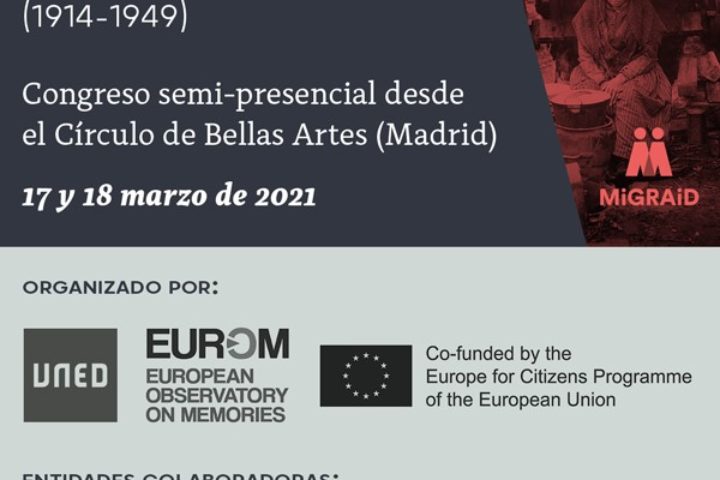March 30, 2021
International Congress “Humanitarian Aid to the Civilian Population in a Europe at War (1914-1949)” Meeting

International Congress “Humanitarian Aid to the Civilian Population in a Europe at War (1914-1949)”, organised by the UNED, Education, Audiovisual and Culture Executive Agency (EACEA- European Commission) and European Observatory on Memories (EUROM-Universidad de Barcelona), at the Círculo de Bellas Artes, in Madrid, from 17 to 18 March 2021 in partnership with ICMEMO and four member museums.
Presentation
The International Congress on “Humanitarian Aid to the Civilian Population in a Europe at War (1914-1949)” is one of the main activities of the European project MIGRAID- Migrations and Humanitarian Aid in Europe (1919-1949) (Ref: 608379). It aims to draw attention to the importance, interest, need and timeliness of humanitarian aid and to disseminate and encourage knowledge and debate about the activities of relief organisations, delegates and volunteers during some of the most turbulent periods in the European history in the 20th century.
The Congress focuses on the different types of relief assistance provided to the civilian population, the most innocent victim of wars, of the interwar period and the post-war period, epochs characterised by enormous human loss, massive destruction, hardship, displacement, famine, internment, deportation, forced labour, genocide and the extermination of populations. Also, by the development and diversification of humanitarian aid carried out on the ground by relief organizations and their volunteers.
This recent European past, in which the solidarity efforts of these organisations allowed for the rescue and survival of groups of civilian populations in dark times, makes us reflect on the present, which is also marked by conflicts, environmental disasters, violence, hunger and persecution that force population movements and their survival in very difficult contexts. To all this, we must add the pandemic caused by COVID-19, which is confronting us with new situations that, once again, have a greater impact on the most vulnerable and helpless people.
(http://migraid.org/congreso-internacional/)
PROGRAMME
17 March 2021
MORNING SESSION
9:00h Welcome reception
9:30-10:00 h Opening session: Ricardo Mairal Usón (UNED Rector) and Valerio Rocco Lozano (Director of Círculo de Bellas Artes)
10:00-10:45hInaugural conference: Alicia Alted Vigil (UNED): El compromiso humanitario de las mujeres: De la Guerra Civil Española a los primeros años de la segunda Posguerra Europea
10:45-11.15h: Coffee Break
11:15-12:45h Round Table: Types of relief to the civilian population
Chair: Jon Arrizabalaga Valbuena (CSIC)
Speakers: Ángela Cenarro Lagunas (Universidad de Zaragoza): Estado y
sociedad civil en la protección social durante la guerra civil; Àlvar Martínez- Vidal (Universidad de Valencia): Medicina humanitaria e innovación tecnológica entre las dos guerras mundiales; Miguel Cabañas Bravo (CSIC): La ayuda y solidaridad de Picasso con los artistas del exilio republicano español
12:45-13:30h: Discussion and remarks
AFTERNOON SESSION
16:00- 17:30h Round Table: Camps, deportation and extermination. From History to Memory
Chair: Diego Gaspar Celaya (Universidad de Zaragoza)
Speakers: Francesca Schintu (Fondazione Fossoli): Dealing with a difficult heritage: the experience of the Fossoli Camp Foundation; Tomáš Fedorovič (Terezín Memorial): Terezín Ghetto – a central point of the transfer of the civilians in the Protectorate Bohemia and Moravia; Iratxe Momoitio Astorkia (Museo de la Paz de Gernika)- Gernika (26/04/1937), preludio de los bombardeos masivos contra civiles en Europa
17:30-18:00: Discussion and remarks
18:00-18:30h: Coffee Break
18:30-19:15h: Keynote Lecture: Dominique Vidau (Maison d’Izieu): Sabine Zlatin: salvamiento, tragedia y memoria de los niños de Izieu (1943-1994)
18 March 2021
MORNING SESSION
10-10:30h Round Table: Communication and humanitarian aid
Chair: Daniel Sánchez Salas (URJC)
Speakers: Sébastien Farré (Université de Genève): Objetos, carteles y películas. Las exposiciones de la Cruz Roja durante la Segunda Guerra mundial; Hugo García (Universidad Autónoma de Madrid): Solidaridad, antifascismo y propaganda durante la Guerra Civil española; Alberto Pena Rodríguez (Universidad de Vigo): Ayuda humanitaria, medios de comunicación y legitimación del franquismo en Portugal durante la Guerra Civil española
10:30-11h: Discussion and remarks
11-11:30: Coffee Break
11:30-12:15h: Keynote Lecture: Daniel Palmieri (CICR)- Perfect victims? Children in the ICRC’s communication
12:30-13:30h Round Table: Book presentation Los olvidados del exilio. Cartas de los últimos refugiados españoles.
Speakers: Juan Cruz Ruiz, Gutmaro Gómez Bravo (UCM), Jesús Egido y Ritama Muñoz-Rojas
AFTERNOON SESSION
16:00-17:30h Round Table: From aid to humanitarian action. Lessons from the past to the present
Chair: Plan Internacional
Speakers:David del Campo (Save the Children), Iñigo Vila Guerra (Cruz Roja Española), Anna Spezie (Servicio Civil Internacional-SCI), Léa Bailly (SCI volunteer), Stephan Basile (SCI volunteer)
17:30-18:00h: Coffee Break
18:00-18:45h: Closing conference: Jordi Guixé Corominas (EUROM-Universidad de Barcelona): Memorias múltiples sobre la ayuda humanitaria en nuestro pasado conflictivo. Ejemplos históricos y apuntes sobre el futuro
18:45-19:15h: Closing ceremony
